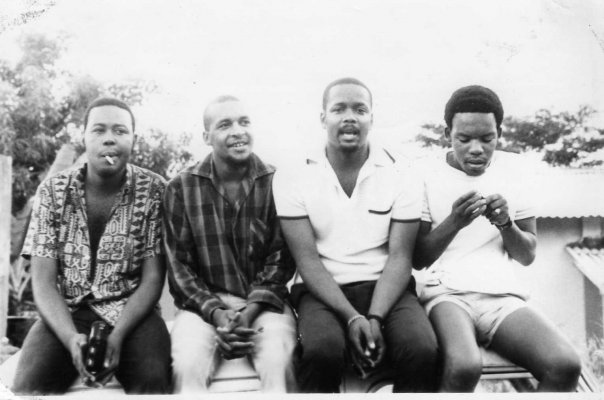 Il y a les choses qu’on cherche. Obstinément, précisément, pendant une heure ou toute sa vie, dans les disquaires, et sur internet. Et puis, il y a les choses qu’on trouve. Ou qui vous trouvent. Inopinément, comme ça, avant même d’avoir pu en soupçonner l’existence…
Il y a les choses qu’on cherche. Obstinément, précisément, pendant une heure ou toute sa vie, dans les disquaires, et sur internet. Et puis, il y a les choses qu’on trouve. Ou qui vous trouvent. Inopinément, comme ça, avant même d’avoir pu en soupçonner l’existence…
Soir d’insomnie, je suis sur Discogs, à cliquer sur chaque hypertexte qui me laisse le faire. Je tombe sur ce disque, au hasard. Coup d’oeil distrait à la tracklist, un détail attire mon attention : la piste 3 s’appelle “I man suffering” et est affublée d’un “written by Gaylords Power Union”. Nombre de diggers engagés dans la reggae-quest connaissent (et bavent) ce graal des Gaylords, I man suffering. Mais impossible, me dis-je : ce morceau n’est sorti que sur une obscure pre-release anglaise du début des 70’s, qu’est-ce qu’une cover foutrait sur un disque dominicain paru plusieurs années après ?
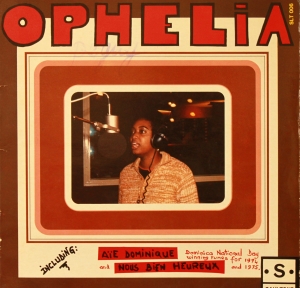 Je cherche illico à entendre ce morceau d’Ophelia. Évidemment, aucune trace sur internet, pas moyen de confirmer l’intuition qu’il s’agit d’une cover du – désormais mythique – morceau des Gaylords. Pour en avoir le cœur net, il va falloir que j’achète le disque en sourdine. Je m’exécute, mesurant que la coïncidence entre titre, crédits et provenance est sûrement trop grande… pour en être une.
Je cherche illico à entendre ce morceau d’Ophelia. Évidemment, aucune trace sur internet, pas moyen de confirmer l’intuition qu’il s’agit d’une cover du – désormais mythique – morceau des Gaylords. Pour en avoir le cœur net, il va falloir que j’achète le disque en sourdine. Je m’exécute, mesurant que la coïncidence entre titre, crédits et provenance est sûrement trop grande… pour en être une.
Et qu’entends-je ?
Il s’agit bien d’une seconde version de cette obscure boucherie ! J’ai le palpitant qui s’excite, un sourire bloqué aux oreilles. J’envoie un extrait à tous mes musical-friends susceptibles d’être intéressés, et une tonne de questions se soulèvent dans ma boîte crânienne. Particulièrement celle-ci : comment, comment putain, comment est-il possible que cette chanson ésotérique ait été assez connue pour que quelqu’un ait envie de la reprendre ? Elle qui, je me répète, n’est sortie QUE sur un 45 tours anglais in-trou-vable ? Je retourne la chose dans ma tête et ne vois qu’une réponse raisonnable : un membre des Gaylords – dominicains comme Ophelia – est présent sur ce disque et lui aura apporté la chanson. L’heure était venue d’enfiler mon imper’ et de déambuler dans les rues vides d’internet pour tenter de confirmer cette hypothèse, et de démasquer le coupable (tintintin…).
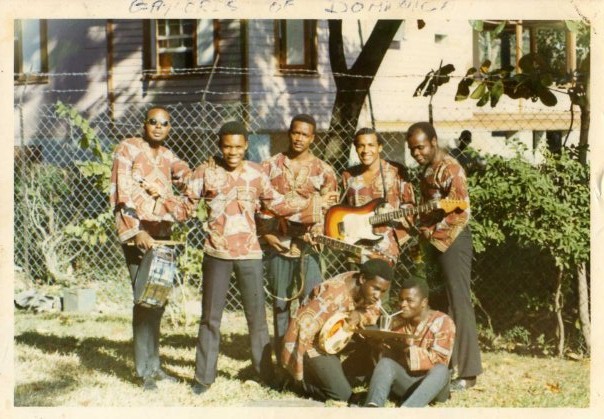 J’ai donc récolté des infos sur le groupe à l’origine de la chanson, ces fameux Gaylords. The Gaylords Power Union est un groupe dominicain, un live band d’hotel, qui de la fin des 60’s au début des 70’s voyagea dans toute la Caraïbe pour jouer son Calypso, sa Soul, son Spouge et, parfois, son Reggae. Aucune mention nulle part de ce “I man Suffering” qui m’intrigue tant. Pas même dans la compilation (assez exhaustive) de leurs meilleures chansons. Je poursuis les recherches, et tombe sur un premier élément décisif :
J’ai donc récolté des infos sur le groupe à l’origine de la chanson, ces fameux Gaylords. The Gaylords Power Union est un groupe dominicain, un live band d’hotel, qui de la fin des 60’s au début des 70’s voyagea dans toute la Caraïbe pour jouer son Calypso, sa Soul, son Spouge et, parfois, son Reggae. Aucune mention nulle part de ce “I man Suffering” qui m’intrigue tant. Pas même dans la compilation (assez exhaustive) de leurs meilleures chansons. Je poursuis les recherches, et tombe sur un premier élément décisif :
« In 1973, they toured the United Kingdom together with John Holt […]. They returned to the UK in 1974 for another tour, and split up in September 1974, when founder member and lead singer, Greg Breaker decided to go solo »
En français, les Gaylords ont fait deux tournées au Royaume-Uni, en 73 et 74. Et justement, ce I man suffering, qui n’est mentionné nulle part et sorti uniquement sur une pre-release UK, sonne exactement comme quelque chose qui aurait pu être enregistré à Londres en 73 ou 74, à l’occasion d’une tournée. Ce pourrait même être, du coup, l’un de leurs tous derniers morceaux, jamais véritablement édités, ce qui expliquerait pourquoi il n’y est jamais fait allusion dans les discographies du groupe. Je sens que je chauffe, mais je n’y suis pas encore tout à fait : tout cela est logique, mais purement spéculatif.
 Et là, révélation ! Je tombe par on ne sait quel concours de circonstances (ou de mots clés) sur une interview d’un membre des Gaylords, Clayton Julien Guiste (oui j’ai trouvé ça, t’imagines la profondeur de ce machin qu’on appelle internet). Il dit :
Et là, révélation ! Je tombe par on ne sait quel concours de circonstances (ou de mots clés) sur une interview d’un membre des Gaylords, Clayton Julien Guiste (oui j’ai trouvé ça, t’imagines la profondeur de ce machin qu’on appelle internet). Il dit :
« [In 1974] we were back in the UK. During that period between ’74 and ’75, several recordings were made, including a reggae tune called ‘I man Suffering’ which I wrote and produced. The singer was the late Starrett Francois, and it was released on a UK based label, Cosmos Records, founded by Bertram John, a Grenadian businessman, who was instrumental in taking us and John Holt on those UK Tours »
T’imagines ma réaction quand je lis ça ? Tout est là : qui l’a écrite, l’occasion, l’identité du lead-singer, l’année, le producteur, le distributeur… Jamais je n’aurais cru trouver autant d’infos sur ce morceau si rare. Résumons pour les français exclusifs : le morcif des Gaylords “I man suffering” fut enregistré à l’occasion d’une tournée en Angleterre en 74. Le lead-singer, cette voix si particulière, est Anthony Starett François, petite célébrité dominicaine, qui chante un morceau écrit par son compagnon de band Clayton Julian Guiste. Le tout fut édité par Bertram Johns, un businessman de Grenade à l’origine de cette tournée anglaise. Restait maintenant à identifier le chaînon manquant : le membre commun aux Gaylords et au disque d’Ophelia, qui aurait apporté ce morceau à la chanteuse. Comparons les line-up :
Members of the Gaylords included Greg Breaker, Clayton ‘Baby Julie’ Guiste, Crispin Seaman, Dennis Joseph, Tony ‘Bingo’ Henderson, Alwin ‘Cocky’ Polydore, Lionel Pinard, Fitzroy ‘Fat Cap’ Williams, Starret Francois, Archie Francis, Walter Cooke and Julian Gibson
Et au dos de la pochette d’Ophelia, qui retrouve-t-on ?
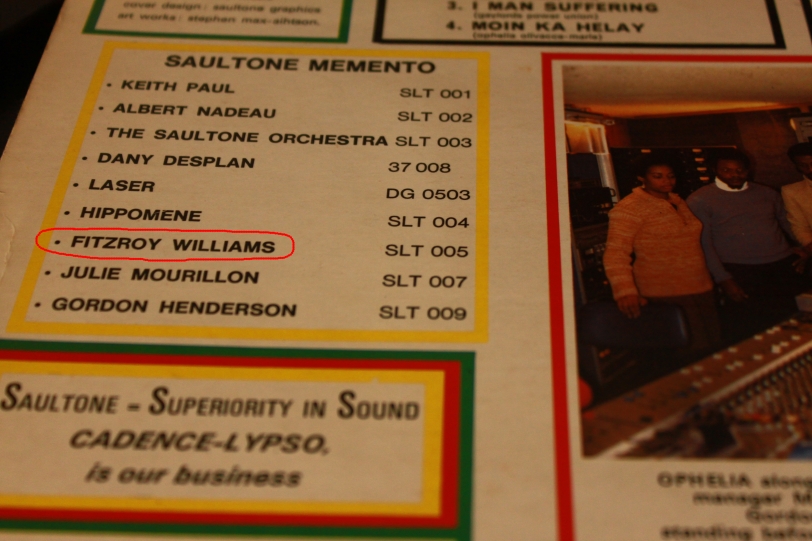 Le même Fitzroy Williams ! Ce coquin ! Conclusion provisoire : sans doute considéra-t-il que cette chanson, jamais véritablement éditée lors de son premier enregistrement en Angleterre, méritait une seconde vie. Et la proposa à sa pote Ophelia, quelques années plus tard, de retour en Dominique.
Le même Fitzroy Williams ! Ce coquin ! Conclusion provisoire : sans doute considéra-t-il que cette chanson, jamais véritablement éditée lors de son premier enregistrement en Angleterre, méritait une seconde vie. Et la proposa à sa pote Ophelia, quelques années plus tard, de retour en Dominique.
Si ce n’est pas l’exacte vérité, je crois qu’au moins on s’en rapproche. En tout cas moi, ça me suffit pour reposer mon imper’ sur le porte-manteau : affaire classée.
Edit : au fait, vous l’avez surement remarqué, la version d’Ophelia est intéressante, mais sans commune mesure avec l’OVNI original des Gaylords. L’orchestration est excellente, mais je dois avouer des réticences sur la voix. Ce qui n’enlève rien au caractère exceptionnelle de cette découverte que je m’empresse de partager avec vous! J’espère que vous prendrez autant de plaisir à lire tout ça que moi à mener l’enquête! C’est pour ce genre d’histoire qu’on “dig”, quelle joie quand elles arrivent!
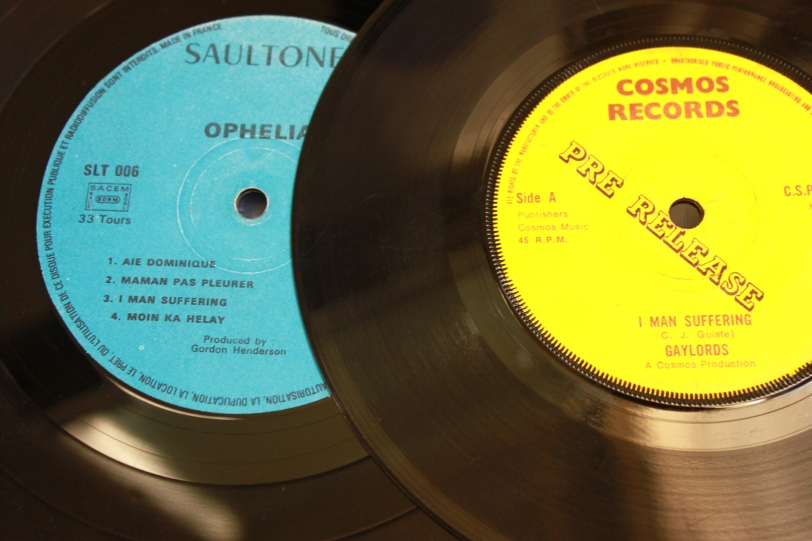 Sources: Je les ai déjà mises dans des liens au-dessus, mais voici mes principales sources :
Sources: Je les ai déjà mises dans des liens au-dessus, mais voici mes principales sources :
– Gaylords Power Union Greatest hits
– Starrett François of the Gaylors dies at age 60 (The Dominican, Feb 2008)
– Interview Clayton Julian Guiste (Othersounds, Apr 2011)
 L’histoire, en fait, ne s’arrête pas là. Gloire d’internet, magie des tuyaux, j’ai réussi à retrouver, grâce au réseau-social-dont-il-ne-faut-pas-prononcer-le-nom, Julien Clayton-Guiste en personne. L’auteur du morceau, membre originel des Gaylords. Je tombe sur un homme infiniment gentil, qui n’avait pas entendu sa chanson depuis qu’il l’avait enregistrée en 1975. Evidemment, à mille lieux d’imaginer qu’elle continue de se jouer aux quatre coins du monde. Il a accepté de répondre à mes quelques questions :
L’histoire, en fait, ne s’arrête pas là. Gloire d’internet, magie des tuyaux, j’ai réussi à retrouver, grâce au réseau-social-dont-il-ne-faut-pas-prononcer-le-nom, Julien Clayton-Guiste en personne. L’auteur du morceau, membre originel des Gaylords. Je tombe sur un homme infiniment gentil, qui n’avait pas entendu sa chanson depuis qu’il l’avait enregistrée en 1975. Evidemment, à mille lieux d’imaginer qu’elle continue de se jouer aux quatre coins du monde. Il a accepté de répondre à mes quelques questions :
 Killers Without Fillers : Greetings Julien ! So it is you : you are the author of this beautiful, deep song, I Man Suffering. Did you know it had gained cult status, and was so highly-rated amongst record collectors, 40 years after you recorded it ?
Killers Without Fillers : Greetings Julien ! So it is you : you are the author of this beautiful, deep song, I Man Suffering. Did you know it had gained cult status, and was so highly-rated amongst record collectors, 40 years after you recorded it ?
Julien Clayton-Guiste : I had absolutely no idea ! I’am shocked to hear that it has achieved such statut!
KWF : You recorded this song in London.. You were there for a tour, right ? Can you tell me more about the circumstances ?
JC-G : We were in London in 1973 for a joint UK tour with the late John Holt, as well as our own tour of England, as we had a lot of dominicans wanting to see us as well. At the end of this tour we re-recorded “hit me with music” our carribean hit single. On returning home we were invited back to the UK for another tour, this time on our own, in 1974. We returned, but at the end of that tour the band split up. The band’s frontman, Greg Breaker Bannis, went solo. The rest of us tried to stay together for a while, but split into two groups after a year. During that year, we recorded few tracks, including “Dream of Africa” and “I man suffering”. To be honest, this was a one-off. I wrote other songs, on our albums and singles, but I man suffering was written to be a filler to put on the back of Starret’s ingle “Dreams of Africa”.
KWF : I’d like to ask you about those vocal harmonies : “Aaaaaa aaaaaaa aaaaaa, I man suffering”. They seem to fall from the moon! Outstanding! Is it the Gaylords doing the backing vocals ?
JC-G : That was a unique feature of The Gaylords. This group, of wich I was a founder member, in 1968, started off as a quartet of vocal harmonies, usually musically backed by a local band. The group later increased it’s line-up, by two, to include a drummer and keyboardist. I was assigned to learn to play bass guitar. One of the original four already played guitar. But Throughought the life of the group the emphasis was always on maintaining excellent harmonies. Obviously, over the years, the line-up evolved, and members came and went. By the time of the UK tour, one of our members was blind keyboardist, now deceased, Starett François. This guy had this sensational high pitched, haunting voice. He led on “Dream of Africa” and “I man suffering” among other hits. So, on this track, he and I teamed up and did all the backing vocals.
KWF : This song is very deep, very touching, and kinda sad… What were you living at the time , that made you write those terrible words, this cry of suffering ? (maybe it’s too personal, I’ll understand if you don’t want to answer this question)
JC-G : To be honest, at that time, because we had been visitors to London, we had no right of stay in this country, no right to work, since the band had finished the tour and work permit had expired. Even though some of us had family living here, we couldn’t rely on them for existence. So it was a continual struggle to live daily for most of the band.
KWF : At the time, did you know what happen to the song after you recorded it ? It seems that it has only been release as a “pre-release” on a “one shot” label, Cosmos… And, it’s rare as hen’s teeth!
JC-G : Jeremie, those were the days of exploitation. In those days, few unknown artistes had any control over their work. So, some stuff we did, we never saw, heard of, or received any credit or payment for. So, no. After that time, we had moved on and never heard about it again.
KWF : Were you aware of the existence of a cover-version by Ophelia? I noticed on the Ophelia’s LP a common member with the Gaylords : Fitzroy ‘fat cap’ Williams. My hypothesis is he brought her the song ? Am I far from the truth ?
JC-G : I did not know it has been re-recorded by Ophelia. It is possible that either Fitzroy ‘Fat Cap’ Williams or the producer, Gordon Henderson, may have suggested the song.
KWF : Thank you very much for the musical gift to the world Julien, and for taking time to answer my questions.
JC-G : You are welcome, my friend. Thanks for bringing it to my notice.
edit du 2 Janvier 2016
Its thrilling to see real collectors quest, I saw myself chasing some tunes as I read this article. Theres so much feeling in it. BIG UP from Brazil
Thank you for the read, I’m very happy that you recognize yourself in it, that’s what I aim 🙂
belle découverte pour moi, jerem, merci
ça m”interpelle quelque part qu’une femme chante “I Man Suffering”, pas toi?
Pas tellement, regarde la scène dans Rockers dans laquelle Horsemouth parle à sa femme, il l’appelle “Man”, c’est pas genré dans la patois j’crois 🙂
“Man” est utilisé en tant qu’être humain, ça n’est pas une question de sexe effectivement
This is what I call “journalism” fi real !!!!! Tout mon respect Jerem. Cette passion, cette quête résonnent en moi … Quelle puissance ce cut … Cet article (et tout ce qu’il engage) lié à ce morceau sont, pour moi, les mamelles sacrées qui m’abreuvent chaque année en été et qui s’appelerio: Cane et River !!! BIIIIIIIG UP
Gros boulot ! Un vrai boulot de journaliste comme il en faudrait bien plus souvent… Big Up.
I have this pre release whats it worth ?
Hello KWF. This is Ophelia’s husband Mc Carthy MARIE. This is how Ophelia came to know the song. Although Guiste was unaware of it, the song actually had a fair amount of popularity on the local radio; so Ophelia heard it on the radio and when we organized to do the recording we decided to add some variety by including the song since Ophelia used to sing it in live performances.
By the way, Fitzroy did not play on Ophelia’s album; all the keyboards were played by Gordon Henderson since Fitzroy was in the Caribbean getting ready for one of his greatest loves – Carnival. The reference to Fitzroy at the back of Ophelia’s record was to an album that Fitzroy had recorded which would soon be on sale! It was in effect an advertisement
I have no idea who brought the Single by the Gaylords to Dominica, but I think it might have been Dennis Joseph who would become the first manager of DBS radio, about 1975 or thereabout. Interestingly the song is getting a good bit of recognition after 40 years.